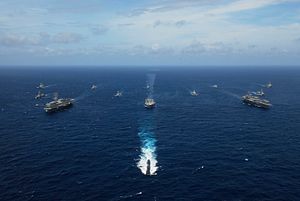For the first time since 2007, the leaders of the United States, Australia, and Japan met on the sidelines of the G20 conference in Brisbane, Australia and agreed to deepen their military cooperation. Specifically, U.S. President Barack Obama, Australian Prime Minister Tony Abbott, and Japanese Prime Minister Shinzo Abe agreed to deepen their cooperation on maritime security. The meeting took place despite its potential to antagonize Beijing, which complains of U.S.-allied states in the Asia-Pacific aspiring to “contain” its rise. The meeting between the three allies came a week after the U.S. and China concluded a landmark agreement on climate change, and after Japan and China held high-level diplomatic meetings for the first time in nearly two years.
The three leaders issued a joint statement following the meeting in which they noted that they had agreed to “deepen the already strong security and defense cooperation” between themselves. The U.S., Australia, and Japan conduct maritime exercises together and share intelligence. The joint statement emphasized their bid to boost “maritime security capacity building,” and emphasized the need for the “peaceful resolution of maritime disputes in accordance with international law.” In addition to maritime security, the three leaders addressed another persistent security threat in Asia, namely North Korea’s nuclear program. They resolved to continue to work toward “eliminating the North Korean nuclear and missile threat” and “addressing human rights in North Korea including the abductions issue.” The abduction issue was likely included in the statement at the insistence of Japanese Prime Minister Shinzo Abe. Abe’s government has been engaging North Korea diplomatically on the abductions issue over the past year.
According to the Associated Press, U.S. officials insist that the trilateral talks were not “meant to send a message to China.” This is despite remarks by the U.S. president that China should “adhere to the same rules as other nations — whether in trade or on the seas.” Aside from Asian maritime security, the three leaders stood together against Russia, noting that they opposed “Russia’s purported annexation of Crimea and its actions to destabilize eastern Ukraine,” and further stated their intention to bring “to justice those responsible for the downing of Flight MH17.” The trilateral statement added to a growing chorus of international pressure on Russian President Vladimir Putin at the G20 over his country’s role in the ongoing crisis in Ukraine.
The meeting between these three leaders hearkens back to a now-defunct 2007 initiative by Japanese Prime Minister Shinzo Abe during his first term dubbed the “quadrilateral security dialogue” (QSD). The QSD included India in addition to Japan, Australia, and the United States, and drew criticism from Beijing as a brazen attempt at containment by the Asia-Pacific’s three most powerful democracies in addition to the United States. Since then, bilateral cooperation has deepened between each of these countries, but trilateral arrangements (including U.S.-Japan-India, and U.S.-Japan-Australia) have grown at a slower pace. This year’s G20 provided an opportune moment for trilateral coordination on security cooperation and comes at a time when China’s actions in its near seas have grown increasingly assertive.

































